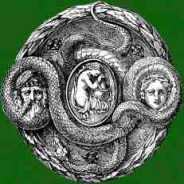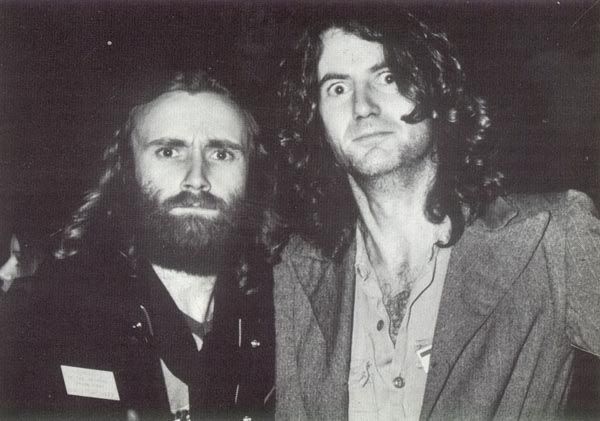/PAlogo_v2.gif) |
|
Post Reply 
|
Page <12 |
| Author | |||||||||||||||
fuxi 
Prog Reviewer 
Joined: March 08 2006 Location: United Kingdom Status: Offline Points: 2459 |
 Posted: July 25 2007 at 03:54 Posted: July 25 2007 at 03:54 |
||||||||||||||
|
I agree with Dick Heath that some of Macan's ideas about how and why prog rock came about might be mistaken. Also, Macan sounds a trifle too academic at times. But as a description of classic British prog this book is highly valuable. And it's definitely more readable than Paul Stump's THE MUSIC IS ALL YOU NEED.
|
|||||||||||||||
 |
|||||||||||||||
nightlamp 
Forum Senior Member 

Joined: May 07 2007 Location: San Francisco Status: Offline Points: 163 |
 Posted: July 27 2007 at 13:52 Posted: July 27 2007 at 13:52 |
||||||||||||||
|
I didn't find Macan's tone to be too academic when I first read the book in '97, nor have I found it so in subsequent references. I'm surprised that people would criticize the tone (or the work in general) for being overly academic; considering the publisher's reputation as an academic press and the author's thumbnail bio on the back cover (clearly stating his credentials and profession), what else would one expect? In a way, I thought it would be more theoretical than it was, but it was a good study and I'm glad it was published.
As a prog fan and musicologist, I think there need to be more academic studies of progressive rock (and its similarly-maligned cousin heavy metal) in the field of musicology & music history; the genres are gold mines of good creative music, and they've been neglected for far too long by the ivory tower. A recent collection of essays from a variety of academic viewpoints--Progressive Rock Reconsidered, edited by Kevin Holm-Hudson--is worth checking out, providing you're not turned off by "academic tones"...  |
|||||||||||||||
 |
|||||||||||||||
Alberto Muņoz 
Forum Senior Member 

Joined: July 26 2006 Location: Mexico Status: Offline Points: 3577 |
 Posted: June 18 2008 at 19:02 Posted: June 18 2008 at 19:02 |
||||||||||||||
|
I contact Ed Macan to send me his book and the Endless Enigma of ELP, hope that i read soon!!
cheers
Alberto
|
|||||||||||||||
 |
|||||||||||||||
 |
|||||||||||||||
Dick Heath 
Special Collaborator 
Jazz-Rock Specialist Joined: April 19 2004 Location: England Status: Offline Points: 12812 |
 Posted: June 19 2008 at 10:08 Posted: June 19 2008 at 10:08 |
||||||||||||||
|
|||||||||||||||
|
The best eclectic music on the Web,8-11pm BST/GMT THURS.
CLICK ON: http://www.lborosu.org.uk/media/lcr/live.php Host by PA's Dick Heath. |
|||||||||||||||
 |
|||||||||||||||
Alberto Muņoz 
Forum Senior Member 

Joined: July 26 2006 Location: Mexico Status: Offline Points: 3577 |
 Posted: June 19 2008 at 12:45 Posted: June 19 2008 at 12:45 |
||||||||||||||
|
i saw his band in his home page, i will listen to his mp3 free samples
Cheers
|
|||||||||||||||
 |
|||||||||||||||
 |
|||||||||||||||
DamoXt7942 
Special Collaborator 

Joined: October 15 2008 Location: Okayama, Japan Status: Offline Points: 17493 |
 Posted: December 15 2008 at 08:49 Posted: December 15 2008 at 08:49 |
||||||||||||||
|
Now I'm listening to the album "Crash Course".
What a scientific and experimental sound!
Ed is a genius.
|
|||||||||||||||
 |
|||||||||||||||
AtomicCrimsonRush 
Special Collaborator 

Honorary Collaborator Joined: July 02 2008 Location: Australia Status: Offline Points: 14258 |
 Posted: February 24 2009 at 22:41 Posted: February 24 2009 at 22:41 |
||||||||||||||
|
The book takes on an extremely academic approach to the genre.
eg:
Few styles of popular music have generated as much controversy as progressive It seemed to me, then, that the time has been ripe for quite some time for a Later the style settles down and we actually read things we want to know such as the lyrics, visuals and styles of prog. Many bands are featured such as Yes, VDGG, and King Crimson of course. Many are missed completely such as Magnum, and Queensryche - it focuses on symphonic and canterbury rather than metal or classic rock. There is a great discography at the back and a few interesting b&w pictures of well known greats such as Hammill and Emerson and some classic album covers - Jade Warrior and Genesis. Overall there is a plethora of info on prog but you need to wade through the academic musical lingo to find it. I loved the section on lyrics and time signatures in particular. Its great to read in depth about the concepts of albums such as 3 Friends and Tarkus.
Heres a snippet of info on the visuals -
Both the albums and the concert experience have a strong visual dimension; in Also some info on the lyrics:
In this passage from his book Stairway to Heaven: The Spiritual Roots of Ro Seay may be right, although it seems to me that the hippies' pantheistic Eastern anyway I loved the book and highly reccommend it to all prog fans worlkdwide - it has something for everyone!
|
|||||||||||||||

|
|||||||||||||||
 |
|||||||||||||||
Dick Heath 
Special Collaborator 
Jazz-Rock Specialist Joined: April 19 2004 Location: England Status: Offline Points: 12812 |
 Posted: March 27 2009 at 12:39 Posted: March 27 2009 at 12:39 |
||||||||||||||
Two pints;
1. This was published by Oxford University Press - which about as a far as you can go wrt academic creditability. (Note: the main attack on the Green's environmental scare mongering, Bjorn Lomberg's The Skeptical Environmentalist , was also published by OUP).
2. But in reality if you really want 'an extremely academic approach', have a go at reading Progressive Rock Reconsidered (Composer Resource Manuals) by Kevin Holm-Hudson.
Personally I remain with the thought that Rocking The Classics is a most readable PhD thesis, that could do with some minor corrections Edited by Dick Heath - March 27 2009 at 12:41 |
|||||||||||||||
|
The best eclectic music on the Web,8-11pm BST/GMT THURS.
CLICK ON: http://www.lborosu.org.uk/media/lcr/live.php Host by PA's Dick Heath. |
|||||||||||||||
 |
|||||||||||||||
Alberto Muņoz 
Forum Senior Member 

Joined: July 26 2006 Location: Mexico Status: Offline Points: 3577 |
 Posted: June 20 2009 at 01:20 Posted: June 20 2009 at 01:20 |
||||||||||||||
|
Finally i have this book in my hands.
Reading the prologue, i like to see that Macan put limits in his work and also defend quite well the musicologist argument. |
|||||||||||||||
 |
|||||||||||||||
 |
|||||||||||||||
Post Reply 
|
Page <12 |
| Forum Jump | Forum Permissions  You cannot post new topics in this forum You cannot reply to topics in this forum You cannot delete your posts in this forum You cannot edit your posts in this forum You cannot create polls in this forum You cannot vote in polls in this forum |